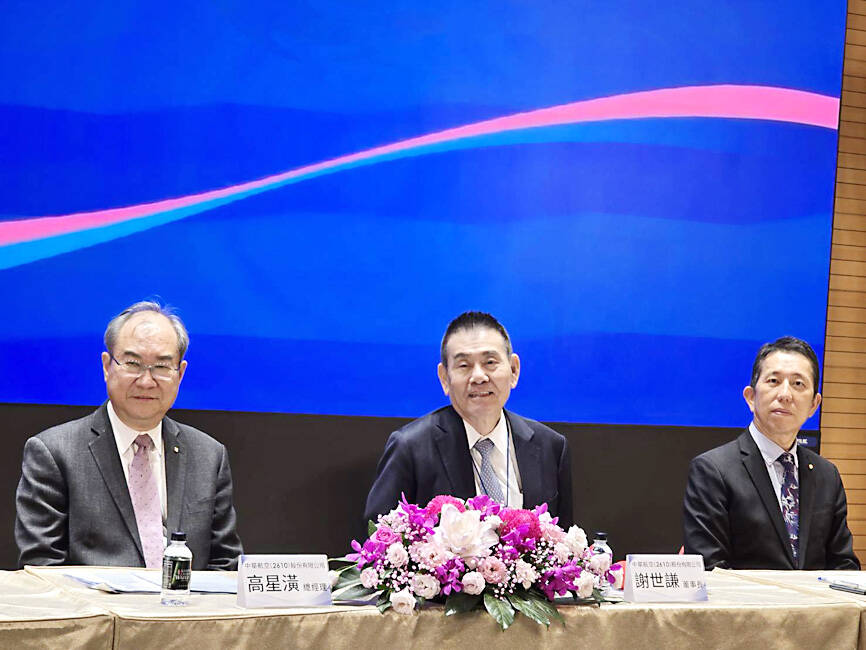China Airlines Ltd (CAL, 中華航空) yesterday said it is optimistic about next year’s business outlook, as the airline continues to renew its fleet on expectations that global passenger traffic would maintain steady growth and air cargo demand would remain strong.
From next year to 2028, the airline is to welcome a new Boeing Co 787 fleet — 18 787-9 and six 787-10 passenger aircraft — to cover regional and medium to long-haul destinations, CAL chairman Hsieh Shih-chien (謝世謙) said at an investors’ conference in Taipei.
The airline would also continue to introduce Airbus SE 321neo passenger planes and Boeing 777F cargo jets, Hsieh said.

Photo: Wang Yi-hung, Taipei Times
With the phase-out of the Boeing 744F freighter fleet and the full deployment of the 777F cargo jets, along with the addition of 787 belly cargo capacity, CAL aims to further enhance its freight capacity and revenue, the company said in an earnings report.
However, the airline said its passenger capacity has only reached 80 percent of pre-COVID-19 pandemic levels, causing ticket prices to rise by 20 to 30 percent. Moreover, the international aviation industry’s supply chains are still way behind on their ability to manufacture new planes, it said.
Hsieh said this situation might continue for another three years and would not ease up until 2027 at the earliest.
“Delivery delays might become the norm,” he said.
Supply and demand would continue to be tight next year, which would further drive up ticket prices.
“As long as passenger traffic remains strong, the overall outlook is still positive,” he said.
Global passenger traffic has been on a steady climb since April 2021, with the International Air Transport Association (IATA) projecting an annual 11.6 percent increase in passenger traffic this year. The Asia-Pacific region is expected to achieve double-digit growth in passenger traffic this year and next, leading other regions, the IATA forecast.
Meanwhile, global trade growth, economic recovery and constraints on maritime shipping capacity have driven continued growth in air cargo demand, with international air cargo demand this year likely to increase 15 percent compared with last year and air cargo volume to grow 5 percent, the IATA said in June.
CAL reported that net profit in the third quarter grew 66.6 percent year-on-year to NT$3.83 billion (US$117.5 million) and earnings per share (EPS) rose 65.8 percent to NT$0.63.
Revenue in the quarter increased 9.09 percent annually to NT$52.02 billion, with passenger business sales edging up 0.7 percent to NT$26.87 billion, while cargo business sales climbed 20.5 percent to NT$15.71 billion, the airline said.
In the first three quarters, total net profit reached a record NT$10.37 billion, up 50.3 percent from a year earlier. EPS increased 48.7 percent to NT$1.71 year-on-year, CAL said.
Cumulative revenue over the period totaled NT$150.93 billion, up 9.7 percent, with passenger business sales growing 12.15 percent to NT$97.15 billion and cargo business sales up 1.02 percent to NT$42.86 billion, it said.
Passenger and cargo revenue maintained steady growth, especially in Northeast Asia, Southeast Asia and long-haul flights, CAL said.

UNCERTAINTY: Innolux activated a stringent supply chain management mechanism, as it did during the COVID-19 pandemic, to ensure optimal inventory levels for customers Flat-panel display makers AUO Corp (友達) and Innolux Corp (群創) yesterday said that about 12 to 20 percent of their display business is at risk of potential US tariffs and that they would relocate production or shipment destinations to mitigate the levies’ effects. US tariffs would have a direct impact of US$200 million on AUO’s revenue, company chairman Paul Peng (彭雙浪) told reporters on the sidelines of the Touch Taiwan trade show in Taipei yesterday. That would make up about 12 percent of the company’s overall revenue. To cope with the tariff uncertainty, AUO plans to allocate its production to manufacturing facilities in

TAKING STOCK: A Taiwanese cookware firm in Vietnam urged customers to assess inventory or place orders early so shipments can reach the US while tariffs are paused Taiwanese businesses in Vietnam are exploring alternatives after the White House imposed a 46 percent import duty on Vietnamese goods, following US President Donald Trump’s announcement of “reciprocal” tariffs on the US’ trading partners. Lo Shih-liang (羅世良), chairman of Brico Industry Co (裕茂工業), a Taiwanese company that manufactures cast iron cookware and stove components in Vietnam, said that more than 40 percent of his business was tied to the US market, describing the constant US policy shifts as an emotional roller coaster. “I work during the day and stay up all night watching the news. I’ve been following US news until 3am

Taiwan will prioritize the development of silicon photonics by taking advantage of its strength in the semiconductor industry to build another shield to protect the local economy, National Development Council (NDC) Minister Paul Liu (劉鏡清) said yesterday. Speaking at a meeting of the legislature’s Economics Committee, Liu said Taiwan already has the artificial intelligence (AI) industry as a shield, after the semiconductor industry, to safeguard the country, and is looking at new unique fields to build more economic shields. While Taiwan will further strengthen its existing shields, over the longer term, the country is determined to focus on such potential segments as

COLLABORATION: Given Taiwan’s key position in global supply chains, the US firm is discussing strategies with local partners and clients to deal with global uncertainties Advanced Micro Devices Inc (AMD) yesterday said it is meeting with local ecosystem partners, including Taiwan Semiconductor Manufacturing Co (TSMC, 台積電), to discuss strategies, including long-term manufacturing, to navigate uncertainties such as US tariffs, as Taiwan occupies an important position in global supply chains. AMD chief executive officer Lisa Su (蘇姿丰) told reporters that Taiwan is an important part of the chip designer’s ecosystem and she is discussing with partners and customers in Taiwan to forge strong collaborations on different areas during this critical period. AMD has just become the first artificial-intelligence (AI) server chip customer of TSMC to utilize its advanced